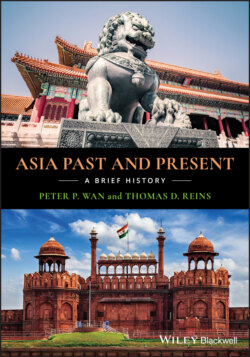Читать книгу Asia Past and Present - Peter P. Wan - Страница 67
The Ming Dynasty (1368–1644): Powerful, Majestic, Conservative, and Brutal
ОглавлениеZhu Yuanzhang (1328–1398) was the founder of the Ming Dynasty. He marched his peasant rebel army under the slogan of “Expel the Mongols—Restore Han China,” captured the Mongol‐Yuan capital of Dadu (1368), and relocated China’s capital to Nanjing. He designated his grandson to inherit his throne, but another son of his seized the throne. The new Emperor Yongle (1360–1424) relocated the capital back to Dadu and renamed it Beijing. Beijing was China’s capital for the next six centuries; the Imperial Palace and the Great Wall as they stand today are renovations of Ming structures.
Zhu Yuanzhang (1328–1398) had the humblest of origins among all major Chinese emperors. He was orphaned in his mid‐teens when his home province was devastated by flood, and his family was wiped out by the plague. Homeless and starving, he took refuge in a small Buddhist monastery. But he soon went drifting again, for the temple had no way of feeding its monks, since it could not collect land rent when there was no harvest. At 25, he joined a major peasant rebel force, the Red Turban Army; married the daughter of his commander; and rose through the ranks to the very top. His wife, who would be the future Empress Ma, was of great help to him on his road to taking the throne. But while he was extremely brutal and paranoid, she was magnanimous. When she became terminally ill, she refused treatment by the physicians her husband had summoned to the palace, for she knew that, if she died after taking their medicine, he would execute them on suspicion of having poisoned her.
Zhu Yuanzhang faced the formidable task of reestablishing Chinese values and institutions after a century of nomadic Mongol rule. Following the ancient maxim that “chaotic times call for harsh measures,” he was personally more despotic than his predecessors, and built a government more centralized than those in earlier dynasties. He promulgated a four‐volume criminal code that provided punishment of extraordinary harshness, showing no mercy to either government officials or the common people. With such brutal means, he strengthened China’s traditional system of monarchism, set standards for government operations, and defined criteria for an individual’s behavior in society.
He stripped his ministers of their independent powers, successfully removing the checks and balances that were put in place during the Tang Dynasty to restrain the powers of the emperor. His control of the government was direct and tight: He could personally make all important decisions, totally free of outside restraints. He employed caning in the royal court as an open punishment for high officials. Other forms of harsh punishment included cutting off fingers, hands, tendons, or kneecaps; castration; public execution by a thousand cuts; skinning alive; and so on. He personally controlled secret agencies that had their own spies and informants who kept close watch on government officials, scholars, celebrities, and the ordinary people. They had the power to make secret arrests, confine suspects in their own jails, use torture in interrogation, and carry out executions.
